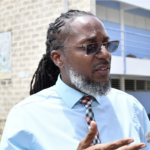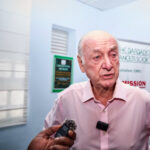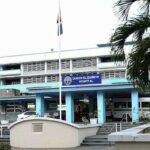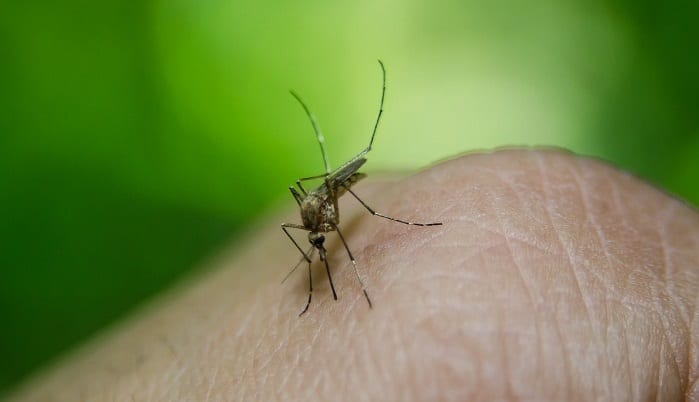Dominican Republic advances in African Swine Fever eradication efforts
Santo Domingo.- Agriculture Minister Limber Cruz announced that while African Swine Fever (ASF) has not been completely eliminated, the government has a structured plan for its total eradication. Significant progress has been made in biosecurity, laboratory infrastructure, and disease prevention within the pork industry.
Santo Domingo.- Agriculture Minister Limber Cruz announced that while African Swine Fever (ASF) has not been completely eliminated, the government has a structured plan for its total eradication. Significant progress has been made in biosecurity, laboratory infrastructure, and disease prevention within the pork industry.
Cruz highlighted that upon taking office, the country lacked the necessary diagnostic capabilities, forcing authorities to wait weeks for test results from the United States. Now, thanks to upgraded local laboratories, ASF detection can be completed in just two hours. This efficiency has drawn international recognition, with the FAO and other global organizations using the Dominican Republic as a reference in ASF detection and control.
Recent tests conducted in February identified ASF in 11 small-scale pig farms, but the virus has been kept under control, with no cases reported in large farms or commercial breeders. The Minister reaffirmed that ongoing collaboration between government agencies and pork producers is key to eradicating ASF entirely.
5 months 2 days ago
Health
Health Archives - Barbados Today
Empowering Our Service Professionals: Breaking Free from Learned Helplessness
“We need fresh ideas! We value your input!” The words echo in meeting rooms across Barbados, often met with a mix of hope and skepticism. Too often, passionate service professionals, our nurses, teachers, police officers, and frontline workers, offer innovative solutions only to be met with resistance: “That’s not how we do things here.” This repeated dismissal breeds learned helplessness, a quiet erosion of initiative that leaves our vital services stagnant and our dedicated professionals burned out. This isn’t just about workplace morale; it’s about the quality of care and service our nation receives.
Barbados thrives on the dedication of its service professionals. From the bustling tourism sector to our essential public services, these individuals are the backbone of our communities. Yet, the very systems they serve within can inadvertently stifle their creativity and problem-solving. While we’re known for our vibrant spirit and “Bajan ingenuity,” too many good ideas remain unspoken, lost to the fear of rocking the boat or being labeled a troublemaker. This silence isn’t golden; it’s costly.
The consequences of learned helplessness are far-reaching. For individuals, it manifests as chronic stress, exhaustion, and burnout. The constant state of alert takes a toll, impacting mental and physical health. For organizations, it means lost innovation, decreased productivity, and high turnover. And for Barbados as a whole, it translates to a decline in the quality of essential services we all rely on.
The good news is that learned helplessness can be overcome. The key lies in fostering a culture of empowerment and providing service professionals with the tools they need to reclaim their agency. This is where self-care coaching, reframed as a strategy for professional development and organizational health, can play a transformative role.
Self-care coaching isn’t about spa days and bubble baths. It’s about equipping individuals with practical skills to:
Challenge Limiting Beliefs: Coaching helps professionals identify and dismantle the negative self-talk that perpetuates learned helplessness. It teaches them to recognize their value and advocate for their ideas effectively. For example, a teacher might learn to confidently propose new teaching methods, even if they deviate from tradition.
Develop Resilience Strategies: Service professionals often face challenging situations and resistance to change. Coaching provides them with strategies to navigate these obstacles, manage stress, and bounce back from setbacks. A nurse, for instance, might learn techniques for managing the emotional toll of demanding shifts while also developing strategies for advocating for better patient care.
Foster Collaboration and Communication: Coaching can facilitate open communication and collaboration within teams. It helps professionals express their concerns constructively, build consensus, and work together to implement positive changes. Imagine a police officer using coaching skills to facilitate community dialogues and build stronger relationships with residents.
Drive Systemic Change: When service professionals feel empowered, they become agents of change within their organizations. They can champion new initiatives, advocate for policy improvements, and create a ripple effect that transforms workplace culture. This could involve a group of firefighters working together to improve safety protocols or a team of tourism workers developing innovative ways to enhance the visitor experience.
To leaders across Barbados: Investing in self-care coaching is not an expense; it’s an investment in the future of our essential services. It’s about creating workplaces where professionals feel valued, supported, and empowered to contribute their best. It’s about building a stronger, more resilient Barbados.
To every service professional: Your well-being matters. Your voice matters. Don’t let learned helplessness silence you. Seek out resources, connect with colleagues, and become an advocate for positive change within your workplace and your community.
Let’s break the cycle of learned helplessness and unleash the full potential of our service professionals. Together, we can build a Barbados where everyone thrives.
The post Empowering Our Service Professionals: Breaking Free from Learned Helplessness appeared first on Barbados Today.
5 months 1 week ago
Health, Local News
Health Archives - Barbados Today
Call for legislation to regulate school vendors amid health concerns
School principals have urged swift action to regulate vendors operating outside school premises, citing concerns over students’ health and the circumvention of nutrition policies.
Robin Douglas, president of the Barbados Association of Principals of Public Secondary Schools (BAPPSS), has called for immediate legislation to address the issue, on the heels of recent reports of suspected psychoactive substance sales to primary school children.
He expressed concern that at present, students can buy what they want from vendors before school in the morning and afterwards in the afternoon and nothing can be done about it.
Using the Schools’ Nutrition Policy and a recent revelation by the National Council on Substance Abuse (NCSA) of the suspected sale of psychoactive substances to primary school children as a reference point, Douglas stressed that while he could not accuse any vendor of criminal activity, there is urgent need for legislation to control what is happening outside the gates of schools.
“There is need for legislation to be rewritten to be able to have something to say to persons outside of the schools’ compound. My school here at Combermere would not be the only problem, this is a problem across all schools, where vendors that are on the outside of the compound, there is nothing that you can do to stop them from being where they are,” the BAPPSS leader told Barbados TODAY.
Acknowledging that the situation poses a challenge to school administrators, Douglas, principal of the Combermere School, suggested that the time may now be right for the call for legislation to be heeded to hasten the legal process.
“The sooner, the better. There is need to heed a strong call that indicates there are major concerns regarding, not just the dietary concerns, but more concerns for the mental and physical health of our children because of the concerns regarding the things that we can’t control,” he said.
“The reality is,” the educational administrator added, “if you have a nutrition policy that is being circumvented by the fact that children can either buy what they want to eat in the morning or just hold their money and buy it when they leave in the evening, then the nutrition policy is being circumvented, and the in-school canteen, they comply with the measures for the nutrition policy, would of course, see a reduced revenue from students who would then buy outside. So it is a difficult situation, and there are not many avenues for school administrators to take.”
Douglas gave an assurance that administrators would not want to deprive anyone of opportunities to make an honest living, but at the same time, he is adamant that school authorities still needed to be more vigilant and watch for any signs of changes in behaviour so they can determine the source.
The BAPPSS president insisted: “I would not be so bold as to suggest that anybody is doing anything criminal. Persons are trying to make a living. However, one of the main difficulties is the way in which it works against the implementation of our nutrition policy.”
He suggested the need for even greater vigilance over what children are consuming in light of the suspected sale of drugs to students.
“There is little that can be done regarding external vending. Without having evidence to suggest that someone is involved in that type of activity, you certainly can’t place that upon persons. It is about vigilance and response given the current concerns that you would have,” Douglas contended.
He said while there is no legal backing to move vendors from outside schools, the only other possible options may be if they are operating from people’s lands without permission or don’t possess health certificates. Vendors can also circumvent these certificates, he explained.
emmanueljoseph@barbadostoday.bb
The post Call for legislation to regulate school vendors amid health concerns appeared first on Barbados Today.
5 months 3 weeks ago
Health, Local News
Health & Wellness | Toronto Caribbean Newspaper
Nocturia? What is this, and is it the reason why i am getting up to pee so much?
BY W. GIFFORD- JONES MD & DIANA GIFFORD-JONES Getting up often to pee at night is called “nocturia” and it’s a great sleep disturber as we age. Frequent peeing could also signal conditions that need medical attention. So, you shouldn’t ignore the problem. It’s not polite to go around asking friends how many times they […]
The post Nocturia? What is this, and is it the reason why i am getting up to pee so much? first appeared on Toronto Caribbean Newspaper.
6 months 3 days ago
Health, #LatestPost
Health Archives - Barbados Today
PAHO calls for intensified efforts to address leprosy, other neglected tropical diseases
Ahead of World Neglected Tropical Diseases (NTD) Day, the Pan American Health Organization (PAHO) on Friday called for increased efforts to eliminate these diseases, which affect more than 50 million people in the Americas.
PAHO said leprosy, dengue, Chagas disease, leishmaniasis, rabies, scabies, schistosomiasis and trachoma are among the more than 20 diseases that primarily impact vulnerable populations with limited access to safe water, basic sanitation and health-care services.
“Addressing this group of diseases requires a comprehensive and multifaceted approach,” PAHO director Dr Jarbas Barbosa said.
He emphasised the importance of implementing strategies such as surveillance, mass drug administration, expanded vaccination coverage, vector control, and increased awareness and education.
Historically, these diseases have had a limited presence on the global public health agenda, receiving little attention and funding.
However, in recent years, it said NTDs have gained greater visibility due to various strategies, such as PAHO’s Disease Elimination Initiative, which aims to eliminate more than 30 communicable diseases and related conditions by 2030, including 12 from the NTD group.
As of December 2024, PAHO said 54 countries worldwide had eliminated at least one NTD.
In the Americas, 11 countries have achieved at least one elimination target.
World Neglected Tropical Diseases Day is observed on January 30. This year’s theme, “Acting Together. Putting Communities at the Heart of the Fight Against NTDs,” underscores “the importance of amplifying community voices, strengthening their capacities, and ensuring people are at the centre of actions while respecting their ways of life to ensure the sustainability of these efforts.”
Leprosy, part of the neglected tropical diseases group, is a chronic infectious disease caused by the bacterium Mycobacterium leprae, which primarily affects the skin and peripheral nerves.
If untreated, it can lead to progressive and permanent disabilities.
However, leprosy is curable through multidrug therapy (MDT), “an accessible and effective treatment.”
Early diagnosis plays “a crucial role in the fight against the disease and timely treatment can prevent disabilities and deformities, and stop transmission,” it said.
In 2023, PAHO said 182,815 new cases of leprosy were reported globally, 13.6 per cent of which were in the Region of the Americas.
Before the COVID-19 pandemic, about 30,000 new cases were reported annually in the Americas.
However, this figure dropped significantly during the pandemic but rose again in 2023 to around 25,000 cases.
PAHO said World Leprosy Day, observed on the last Sunday of January, “aims to raise awareness about the disease and end discrimination, stigma and prejudice against patients.”
SOURCE: CMC
The post PAHO calls for intensified efforts to address leprosy, other neglected tropical diseases appeared first on Barbados Today.
6 months 1 week ago
Health, Regional
Health Archives - Barbados Today
Prostate cancer rates alarm as younger Barbadians at risk
The Barbados Cancer Society (BCS) has sounded the alarm on the increasing incidence of colon cancer in the country, attributing it largely to Barbadians’ current diet.
The Barbados Cancer Society (BCS) has sounded the alarm on the increasing incidence of colon cancer in the country, attributing it largely to Barbadians’ current diet.
This urgent health concern was highlighted during the society’s annual raffle prize-giving ceremony, where campaigners called for immediate action to address the growing crisis.
The Cancer Society president, Professor David Rosin, emphasised the urgent need for dietary improvements to curb the trend.
“The [second] most common cancer [here] is colon cancer [and] it’s probably due to diet,” he explained. “It’s another cancer that is also more commonly passed down through families. Why it is increasing here [however] is because of the diet. Your parents and grandparents ate a much healthier diet with high fibre, lots of breadfruit, etcetera, whereas nowadays, I’m afraid to say, it’s a lot of fast food and food which is low in fibre.
“Really, we have to impress upon people and also the young people in the schools that they should eat healthy.”
The professor also highlighted the prevalence of prostate cancer, with over 300 cases reported annually.
Professor Rosin said: “Here in Barbados, the commonest of cancer is still – despite it being half the population [men] – prostate cancer.
There are in fact 320 new cases every year out of a population of 285 000 people. That is about 45 per cent of all cancers [reported locally]. It’s really something to worry about.
“The anxiety here is not only is it the commonest cancer, but it is also unfortunately more aggressive and occurring in younger men.”
Shelly-Ann Forde, the society’s administrative director, added that recent community outreach efforts have seen rising interest among some men in coming forward for the necessary testing.
She said: “At a recent outreach event sponsored by [the Bureau of] Gender Affairs, we were doing free screenings and we even had to turn back some of the men. We already had the initiative to go out into the community before that, but that kind of reinforced the fact that men do want to be screened, and if there is an opportunity they do come out and try to be screened.”
However, Professor Rosin said the current number of men coming forward remains inadequate and urged families to encourage testing.
He said: “I would ask their wives, sisters, brothers, to come forward and say to them ‘be sensible; go and have a PSA test’. If you can [diagnose] a cancer at the beginning, the treatment is much less aggressive, and you won’t need radical surgery, radiotherapy, chemotherapy, all that. It’s really almost stupid not to be screened.”
During the event, the first-place winners of the 2024 BCS raffle, Raymond and Sheena Gill, represented by Shauntel Rock, received a $25 000 prize. They donated $5 000 of their winnings to the Cancer Society.
The post Prostate cancer rates alarm as younger Barbadians at risk appeared first on Barbados Today.
6 months 1 week ago
Health, Local News
Health Archives - Barbados Today
Disabled community calls for ‘inclusive’ QEH services
Blind and visually impaired persons are urging the Queen Elizabeth Hospital (QEH) to implement audio alerts for medication collection, highlighting a significant accessibility gap in healthcare services.
Their calls come in the wake of repeated challenges members of that community encounter while accessing certain services at the island’s lone public general hospital.
On Thursday, a caller on the radio call-in programme Down to Brass Tacks complained that while audio alert indicators were put in place to accommodate persons with disabilities in at least two of the island’s polyclinics, more could be done at the hospital.
The caller, who identified himself as blind, said: “What I am calling about is something that I experience every time I go to the pharmacy at the QEH and I hoping that the director of the QEH and the minister is listening to me very carefully. I am blind, let me make that clear first. When I go to Winston Scott Polyclinic or the Edgar Cochrane Polyclinic to get medication, there is a device at the pharmacy that tells you the number and you then would go up to the pharmacy and hand in your prescription and get your medication. But what I have observed is that when I got to the eye clinic at the hospital and I have to go and get medication from the pharmacy, they have that same device but it doesn’t talk. So anybody that goes to the pharmacy at the QEH that is blind or visually impaired they have to depend on somebody to tell them when their number is up on the screen. I would like the director of the hospital or the minister to look into that and make sure that they put one of the ones that talk.”
Failing that, the caller suggested that a teller terminal system be set up in which people could pull numbers and an automated audio caller would announce the number.
Vice-president of the Barbados Council for the Disabled, Ambassador Kerry-Ann Ifill, confirmed that her organisation had received numerous complaints about the situation over the years.
Ifill told Barbados TODAY that there were technologies such as vibrating buzzers that could be used.
“They could use the same system that the restaurants are using, the buzzer system, which would make better sense because they flash and vibrate and use them for people who only have disabilities. That way, when you go and you are blind or deaf, nobody would have to tell you when your number [is] called. That is a simple solution and yes, it is a big issue that we face with the hospital,” she said.
Asked how persons with disabilities get around the issue, she said: “With a lot of frustration and there are some good people out there that will tell you your number called or ask you what number you have and monitor it for you. Some nurses also assist but it doesn’t lend to an independent experience.”
Ifill added that people with disabilities wanted to be independent and feel empowered and issues such as this were a major setback.
When contacted, the QEH promised a response to the concerns highlighted, but no statement was provided up to press time. (SZB)
The post Disabled community calls for ‘inclusive’ QEH services appeared first on Barbados Today.
6 months 1 week ago
Health, Local News
Health Archives - Barbados Today
Northern parishes targeted for fogging
The Vector Control Unit will concentrate its fogging exercise in St Lucy and St Peter for most of this week.
On Monday the team will visit communities in St Lucy, including Trent’s Road, Hannays Road, Swampy Town, and Hope Bridge Road.
The Vector Control Unit will concentrate its fogging exercise in St Lucy and St Peter for most of this week.
On Monday the team will visit communities in St Lucy, including Trent’s Road, Hannays Road, Swampy Town, and Hope Bridge Road.
The Unit will focus on areas in St Peter on Tuesday when it goes into Speightstown, Queen Street, Bovell Road, Mango Lane, Chapel Street, Gooding Alley, Major Walk, Sand Street, Church Street, Golden Mile with avenues, and environs.
Wednesday will see the team return to St Lucy, where the following areas will be sprayed: Pie Corner, Little Bay, Upper Salmond, Josey Hill, Rock Hall, Mount View, Chance Hall, Cave Hill, and Bishops.
It will be the turn of Graveyard, The Risk, Date Tree Hill, Boscobelle, Collins, Diamond Corner, Moore Hill, Castle, and Gays in St Peter, on Thursday.
The fogging exercise for the week will conclude on Friday in the following St Michael and Christ Church districts: Deighton Road, Gooding Road, Brathwaite Gap, Dayrells Road, Plum Close, Rockley New Road, Ventnor Gardens, and Golf Club Road.
Fogging takes place from 4:30 to 8:30 p.m. daily. Householders are reminded to open their windows and doors to allow the spray to enter. Children should not be allowed to play in the fog.
Members of the public are advised that the completion of scheduled fogging activities may be affected by events beyond the Unit’s control. In such circumstances, the Unit will return to communities affected in the soonest possible time.
The post Northern parishes targeted for fogging appeared first on Barbados Today.
9 months 1 week ago
Health, Local News
Pro Consumidor sets October 30 deadline to cover bottled water from sun
Santo Domingo.- Pro Consumidor’s executive director, Eddy Alcántara, announced that as of Wednesday, October 30, all companies involved in the distribution, marketing, and bottling of drinking water, as well as small businesses, will be prohibited from displaying water bottles in direct sunlight.
Santo Domingo.- Pro Consumidor’s executive director, Eddy Alcántara, announced that as of Wednesday, October 30, all companies involved in the distribution, marketing, and bottling of drinking water, as well as small businesses, will be prohibited from displaying water bottles in direct sunlight. This decision comes after scientific studies demonstrated the health risks posed by such exposure.
Alcántara emphasized that the measure aligns with agreements made with water bottling associations to prevent further exposure of this essential product to harmful conditions. Businesses are urged to store water properly to ensure it remains safe for consumption.
Pro Consumidor had previously warned of “drastic” sanctions against companies that fail to comply with this regulation due to the risks associated with sun exposure.
9 months 2 weeks ago
Health
CMD proposes law to decriminalize unintentional medical acts
Santo Domingo.- The Dominican Medical Association (CMD) submitted a draft law to the National Congress aimed at decriminalizing medical acts where there is no intent to cause harm. The proposal, presented by Deputy Dr.
Santo Domingo.- The Dominican Medical Association (CMD) submitted a draft law to the National Congress aimed at decriminalizing medical acts where there is no intent to cause harm. The proposal, presented by Deputy Dr. Monserrat Santana to the Chamber of Deputies, emphasizes that the doctor-patient relationship is based on good faith, with medical procedures focused on patient well-being, and should not be criminalized without proof of malicious intent.
The CMD bases its proposal on several constitutional principles:
- The right to health as a fundamental right in the Dominican Constitution.
- Protection of human dignity as a core function of the state.
- Presumption of good faith in medical procedures aimed at preserving life and health.
- A need for clear legal criteria to ensure health professionals are penalized only when malicious intent is proven.
The CMD believes this reform is crucial for providing legal security to doctors while upholding patients’ fundamental rights. The organization hopes Congress will favorably consider the proposal, as it would reduce unjustified legal risks for medical professionals and strengthen the Dominican health system. The project seeks a balance between responsible medical practice and legal protection for both doctors and patients.
9 months 2 weeks ago
Health





